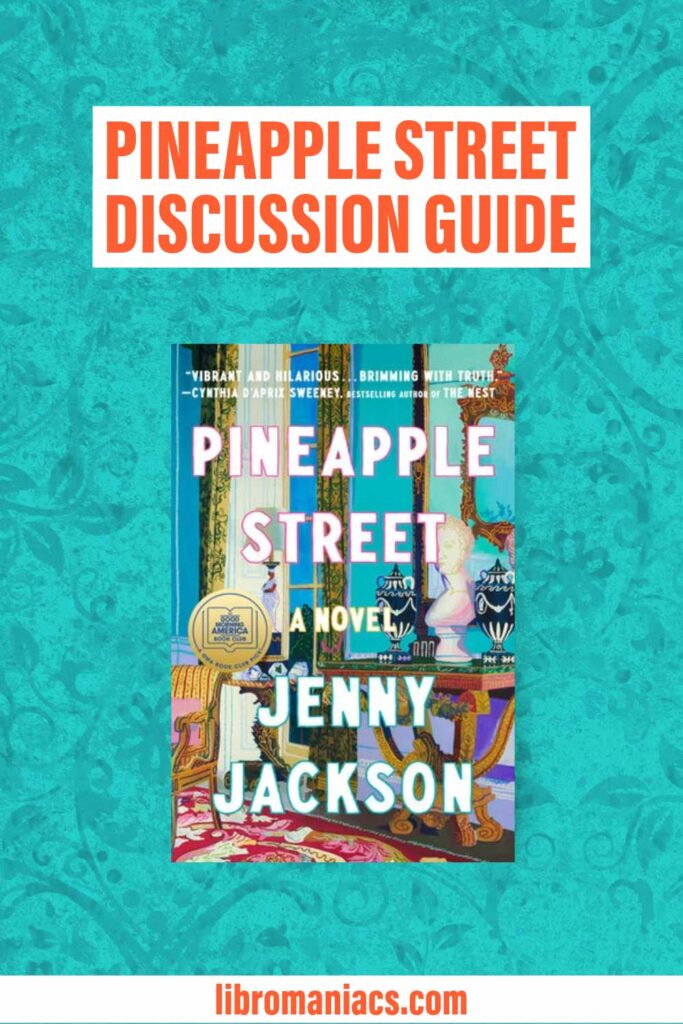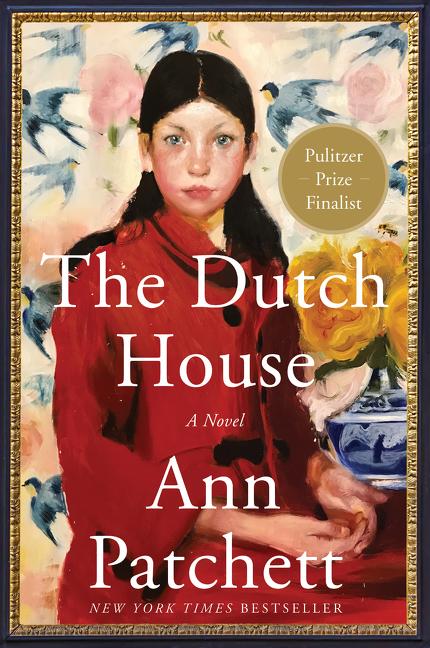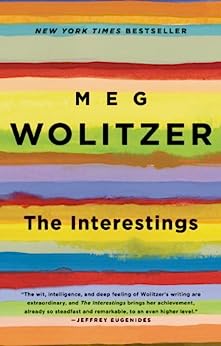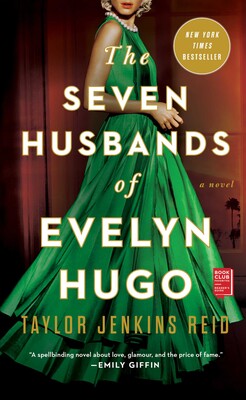If you enjoy peeking into the messy lives of the ultra wealthy, Pineapple Street is a perfect match for you and your book club. Pineapple Street examines sibling cliques, WASP guilt, and the power money has to shape a person’s identity for better or worse – all inside the shiny bubble of east Manhattan.
Our discussion guide for Pineapple Street will help you find the deeper message under this novel’s witticisms. First, we’ve provided a synopsis of Pineapple Street to help you keep track of all that family drama. Next, we’ve provided 10 Pineapple Street book club questions. Talk them over with your book club members, and you may be surprised by the different perspectives in your group. Last but not least, we’ve pulled a few quotes from Goodreads book reviews to spice up your conversation. (Not everyone is a fan of this bestselling novel!)
And for more upper class escapism, read to the end of this guide for a list of 3 suggestions of books like Pineapple Street!
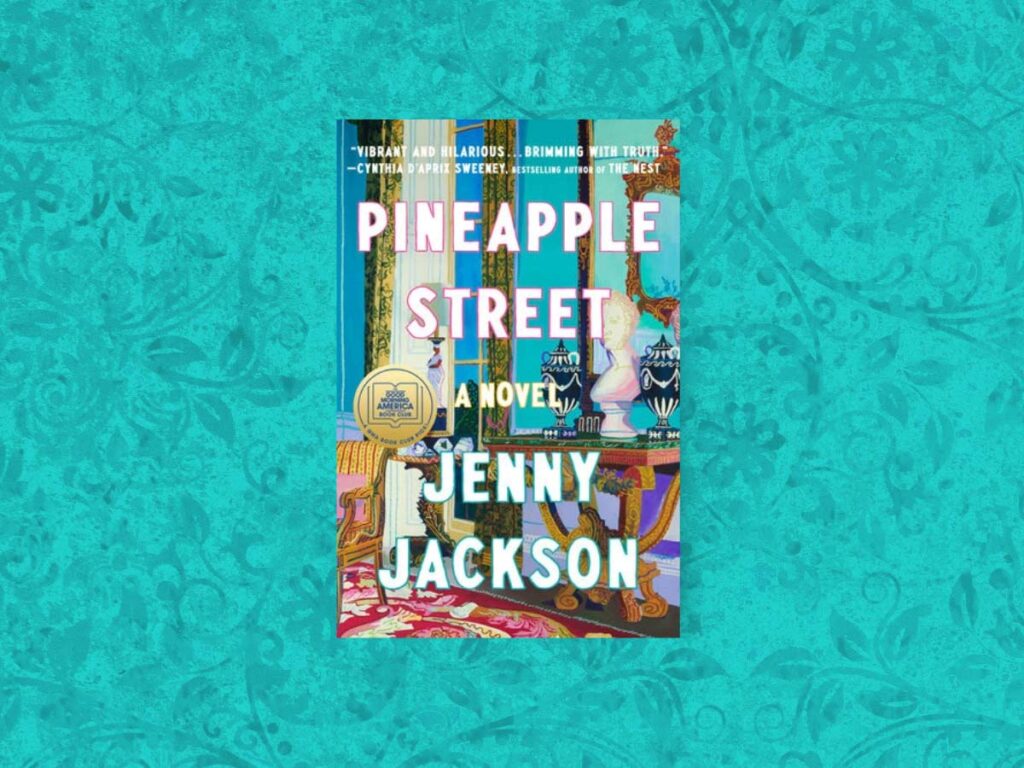
(This article contains affiliate links. This means that if you choose to purchase, I’ll make a small commission.)
Pineapple Street Synopsis
(We always chose to provide the publisher synopsis because we feel that it’s worthwhile to discuss whether the official book description actually squared with your experience of the book.)
Pineapple Street, Jenny Jackson
Darley, the eldest daughter in the well-connected old money Stockton family, followed her heart, trading her job and her inheritance for motherhood but giving up far too much in the process; Sasha, a middle-class New England girl, has married into the Brooklyn Heights family, and finds herself cast as the arriviste outsider; and Georgiana, the baby of the family, has fallen in love with someone she can’t have, and must decide what kind of person she wants to be.
Rife with the indulgent pleasures of life among New York’s one-percenters, Pineapple Street is a smart, escapist novel that sparkles with wit. Full of recognizable, loveable—if fallible—characters, it’s about the peculiar unknowability of someone else’s family, the miles between the haves and have-nots, and the insanity of first love—all wrapped in a story that is a sheer delight.
10 Pineapple Street Book Club Questions
These questions have been tailored to this book’s specific reading experience, but if you want more ideas, we also have an article with 101 generic book club questions.
- The Stockton children have an extremely close relationship, to the point that their partners feel excluded from their clique. Do you belong to any cliques that might make others feel excluded? How much do you value inclusion vs. preserving an inner circle of friends?
- Tilda’s talent for avoiding large emotional displays sometimes makes her children feel isolated. Yet, in other ways, Tilda has a strong presence as a mother: practicing sports, giving gifts, and throwing parties for her children.
Do you think Tilda is at fault for creating the emotional distance between herself and her children, or are the children also failing to understand their mother?
- Early in the novel, Georgianna observes, “It was easy to say that money was the root of all evil, but so many of the things money could buy provided dignity, health, and knowledge.”
Can you see ways that money has made you a better person? Can you imagine a system that allows money to do more good than harm to society?
- Although the house on Pineapple Street is large and decorated with expensive art and furniture, Sasha finds the house tacky and uncomfortable. How do you think the house symbolizes the conflict between the upper and middle class?
- Sasha compares her peaceful relationship with her husband, Cord, to her passionate relationship with her first boyfriend, Mullin, and reflects that “she wanted someone who loved her but didn’t need her.”
Do you think Sasha was wise to change what she wanted out of a relationship? What might she sacrifice by choosing a partner like Cord instead of Mullin?
- Georgianna consents to continue her relationship with Brady after discovering that he’s married to another woman. Do you think Brady is exploiting her, or does her consent make her equally responsible for the affair? Do you believe Brady when he says he loves Georgianna?
- After Malcom was fired, Darley chooses to conceal that fact from her family for weeks, until Malcolm explains that the secret makes him feel like he’s only acceptable to the Stocktons because of his paycheck.
Do you sympathize with Darley’s desire to keep Malcolm’s situation secret? How does Darley make Malcolm feel valued in her family and how does she fail to do so?
- Curtis tells Georgianna that “income equality is the most shameful issue of our time.” Do you agree? What other issues might claim this title?
- Darley and Cord defend Georgianna’s bad behavior by claiming that she is only a child. Georgianna is twenty-six years old. Do you think their claim is valid? At what age can we expect people to start acting “adult”?
- When Cord returns home with Sasha to visit her family, he seems to fit right in with the her siblings and cousins. Why do you think Cord is so much more comfortable with Sasha’s family than Sasha is with the Stocktons?
- BONUS QUESTION: By the end of the novel, most of the Stocktons seem to be on a path to self-improvement and reconciliation. Which characters do you think are most/least capable of finding “happily ever after”?
Selected Reviews for Pineapple Street
(Use these selected Goodreads reviews to compare with your own experience of the book. Do you agree or disagree with the reviews?)
“The character studies are excellent. You realize, beneath the surface, some are really messed up as you view their life and loves, their ups and downs. The three female voices seem very separate, even disparate, but that is entirely the point as they have learn to plough their own furrow. You witness hurt, pain, sadness, hypocrisy and joy all told with humor and dry wit.”
“I loathed Georgiana. LOATHED. And I’m sorry, she can give all her money away every day (but still have her $37 million and future inheritance from her parents, mind you), spout all the woke jargon under the sun, and virtue-signal like a boss…she is still a bad person. And it’s not the money’s fault. My favorite character in the book was Tilda. At least she owned who she was with no apology.”
“The writing is good/perfunctory, but there’s an absence of plot, a lack of depth to the characters, and a heavy-handed approach to social issues like racism, classism, gentrification – I actually winced reading some of the statistics blatantly dropped in at times without a hint of irony. It’s about as subtle as the Stocktons are self-aware.”
“It felt like a book written about rich people by someone who thinks they know all about rich people by having watched reality TV. I’m not saying that there aren’t some very interesting statements that can be made about class, wealth, socioeconomic status, etc. Many authors do these topics extremely well and when done well it can be revelatory. But this book was so surface level it provided zero insight and didn’t give any new perspective. I also really felt like it was super cheap of the author to sprinkle in buzz-worthy topics like racism, sexism, the shrinking middle class, etc. without actually even bothering to discuss these issues or have anything meaningful to say about them. It seemed like she was just doing it to get “woke” points rather than actually trying to make any actual statement.”
3 Books Like Pineapple Street
We’ve also got a book club guide for Lies and Weddings (by Kevin Kwan), which also features rich people problems.
The Dutch House, Ann Patchett
If you enjoyed the sibling dynamics in Pineapple Street, you’ll be sucked in by the brother-sister devotion in The Dutch House. Unlike the Stocktons, young Danny and Maeve are exiled from their lavish childhood home when their father marries a younger woman. Together they navigate a world where they feel out of place, comforting each other with memories of home that, over the years, transform into their own personal mythology. But when an opportunity to reclaim what they’ve lost arises, their devotion to each other and their past is put to the test.
Read this one for book club and use our Dutch House discussion guide.
The Interestings, Meg Wolitzer
Continue your exploration of money’s power to divide loved ones with The Interestings. This witty novel follows the lives of six teenagers who pledge their eternal friendship to each other inside a summer camp teepee. But when one of the teens grows into a cartoonist responsible for the creation of an iconic comic strip and an empire of franchised merchandise, fame and wealth threaten to make old friends unknowable.
The Seven Husbands of Evelyn Hugo, Taylor Jenkins Reid
A story that could be told by Tilda Stockton herself, The Seven Husbands of Evelyn Hugo follows an enigmatic Hollywood star as she recounts the sacrifices of heart and conscience that she made to succeed in a world where her appearance was constantly scrutinized. For years, she has played (and won) the fame game, but now she’s ready to reveal her most dangerous secret: the identity of her one true love.
Share these Pineapple Street book club questions with your friends:
